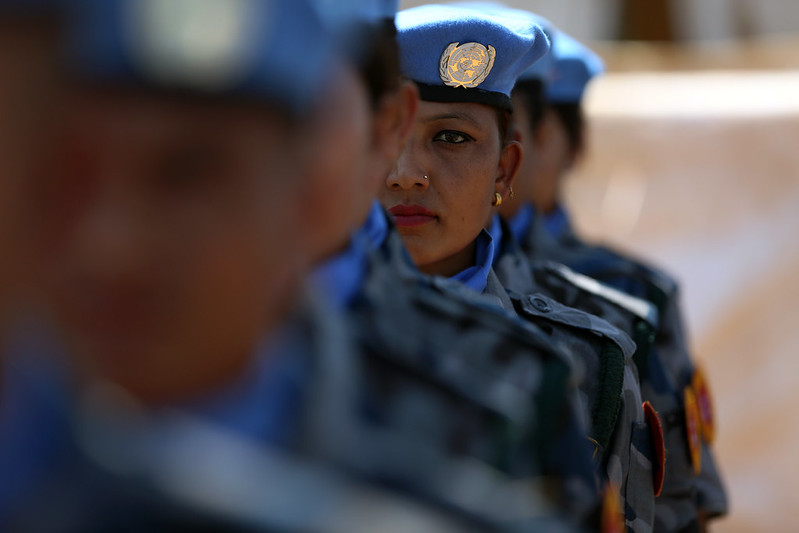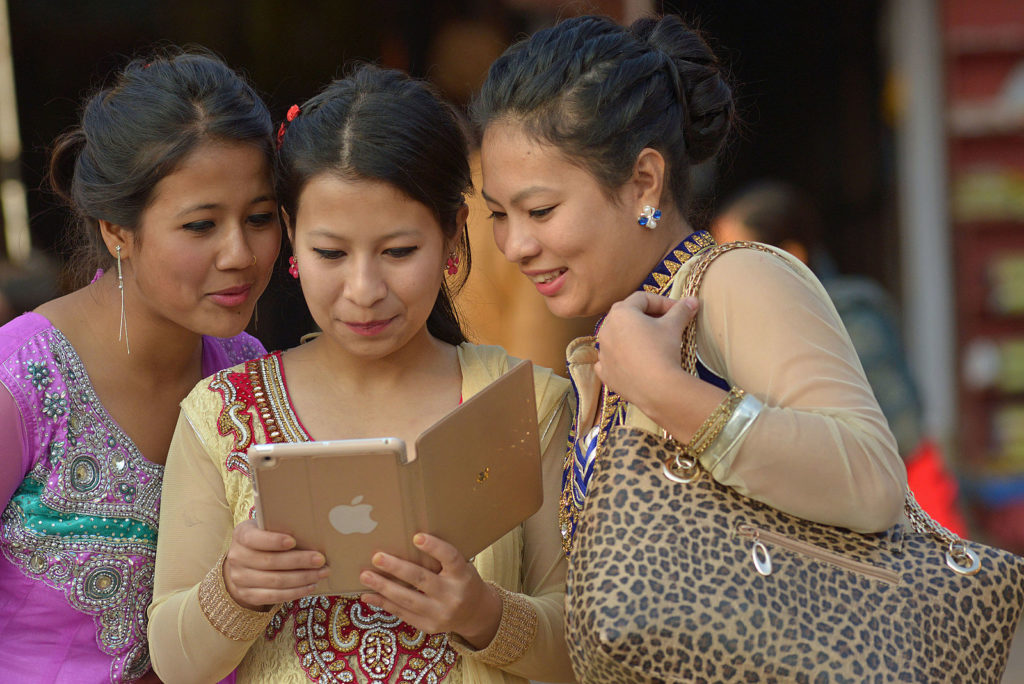
In July 2021, Ratnanagar Municipality in Bagmati Pradesh enacted a policy that banned women with children under the age of two from going abroad for foreign employment. The local representatives reasoned that children were deprived of maternal care when mothers migrated abroad for work. This episode exemplifies how Nepal’s patriarchal system finds ways to restrict women’s mobility and right to live their lives on their own terms. It also explains why the absence of women in policy-making positions perpetuates the marginalization of women outside of the home.
Nepal must undo the deeply ingrained patriarchal structures and gender biases in diplomacy, security, and politics. While women have been ensured representation and given political positions accordingly in recent times, they still struggle to leverage power. Their entry into diplomacy, security, and politics is seen as mere tokenism, rather than participation in their own right. To promote women in positions of power, continually advance women’s rights and prioritize gender equality, Nepal must consider a Feminist Foreign Policy (FFP) because including women and other marginalized communities will help rethink security and empowerment from the viewpoint of the most vulnerable.
Nepal must consider a Feminist Foreign Policy (FFP) because including women and other marginalized communities will help rethink security and empowerment from the viewpoint of the most vulnerable.
Gendered Citizenship and Its Implications for Foreign Policy
Nepal’s 2015 constitution denies a woman her right to provide citizenship to her children. The word “citizen” then is associated with a man. By that notion, we limit the services of women as wives and mothers. The consequence of such a notion is twofold. First, it rests on conventional understandings of what it means to be a male or a female citizen. Second, it puts forth the gender-differentiated roles individuals might have towards the country in times of war and peace. Considering men as the guardians of the state in times of war presents a dichotomy of the protector and the vulnerable. This binary has dictated how politics, both domestic and international, has been conducted and understood.
International politics is also rife with androcentrism. Perhaps that’s why Gloria Steinem said, “What happens to men is frequently viewed as political, and what happens to women is cultural.” This idea of considering man as a political animal and woman as a cultural being explains the absence of women from foreign policy affairs. The personal is political, and political is personal—this tone-setting slogan is the basis for demanding women’s involvement in various aspects of international politics. Traditionally, diplomacy, the military, and international politics have been considered predominantly male domains. Therefore, new ways of thinking about discrimination, gender, public life, and political participation have led to a re-imagination of public and political life. There is a need for a FFP because gender both constitutes and is constituted by unequal power relations and social structures.
Political Participation of Women in Nepal: Successes and Improvements
Nepal leads South Asia in women’s political representation. Today, women constitute 33.5 percent of the federal parliament and 34.5 percent in provincial assemblies. This number increases to a staggering 41 percent in local level assemblies, with more than 14,600 women elected to political office in 2017. This enables greater access to resources and decision-making. These are forms of power that allow women to shape decisions that affect their lives.

While the structural changes are a step in the right direction in Nepal, the laws are embedded within patriarchal and oppressive power structures that inhibit women from reaching their full potential even while in political offices. Increased political empowerment could translate to either introduction or increase in progressive legislation. For example, in the context of Nepal, the perception of citizenship and national security nexus could be starkly different with women legislators’ voices front and center. Progressive policies even hold the potential to change societies. Women leaders’ actions at home can draw attention to the particular country and help legitimize the envisioned foreign policy.
Structuring a Feminist Foreign Policy in Nepal
Nepal has come a long way in the past decade when it comes to ensuring the representation of women in political and administrative affairs. But the changes remain cosmetic as best. For example, the number of women in foreign services has increased over the years. However, inside the different divisions of the foreign ministry, women officers are mostly confined to the protocol section. The underlying assumption is that they are good with hospitality and hence stereotyped in their work divisions accordingly.
This lacuna calls for a feminist foreign policy—an approach that advocates for the protection of women and marginalized communities in its attempt to redefine the concepts of power, security, and diplomacy. Gender norms, discriminatory legal systems, and economic inequality often compound the vulnerability to violence that women and other marginalized groups face. By formulating a feminist foreign policy, Nepal should also consider that women and other marginalized groups consist of a diversity of people: internally displaced people, migrant domestic workers, those in the informal economy, people with disabilities, and others. Using a feminist approach to build coalitions holds the potential to “shift the power” and ensure sustainable change. By not defining security within the frame of war and military alone, a multi-dimensional concept of security can be envisioned, which addresses challenges to safety, survival, and livelihoods, coupled with the dignity of the people and the environments they live in. It will help policymakers delve deeper into understanding of what populations and values their foreign policy agendas serve. This should be the ultimate goal of a feminist foreign policy in Nepal.
Overcoming Obstacles
South Asia has had an exemplary history when it comes to putting women in positions of power, though this has not been enough to overcome entrenched barriers. In Sri Lanka, Sirimavo Bandaranaike was the first female prime minister of the world in the 1960s. Following the trend, even India, Pakistan, and Bangladesh proceeded to elect women as their heads of the government. For example, during the Indo-Pakistan War of 1971, former Indian Prime Minister Indira Gandhi attempted to make West Pakistan’s handling of Bengalis a human rights issue anticipating that international pressure would make way for a peaceful settlement.
Using a feminist approach to build coalitions holds the potential to “shift the power” and ensure sustainable change.
Despite such a promising trend, women in this part of the world are still subjugated, and the participation of women in politics and foreign policymaking is low. In many South Asian families, women are usually considered peacemakers, continually building alliances and mending relationships inside the family structure, which are all skills originating in the home that are integral to dealing with national and international actors.
If Nepal pursues a feminist foreign policy and actively takes steps to ensure that the increased representation translates into concrete action, it can project a new image that has a significant impact on its global standing. It could increase its bargaining power and enable the creation of new norms. Current foreign policy analysis fixates on abstractions such as the balance of power or trade. While these considerations are important, a FFP can go a step forward and prioritize humanitarian interests over hard power and other traditional security concerns to stimulate a broader way of thinking.
Editor’s Note: Since Sweden announced a Feminist Foreign Policy in 2014, several other nations have also begun this journey, however the conversation and frameworks are largely rooted in western countries. In this series, run jointly with the Kubernein Initiative, contributors from across the subcontinent discuss what it means to have a “feminist foreign policy,” and how this approach could merge efforts in foreign affairs, regional policy and geopolitics, development and women’s empowerment in South Asia. The series asks to what extent countries in South Asia have incorporated a Feminist Foreign Policy approach, and the ways in which a gender-conscious approach may support security, democracy, and diplomacy on the subcontinent.
***
Image 1: United Nations Mission in South Sudan (UNMISS) via Flickr
Image 2: Wikimedia Commons


